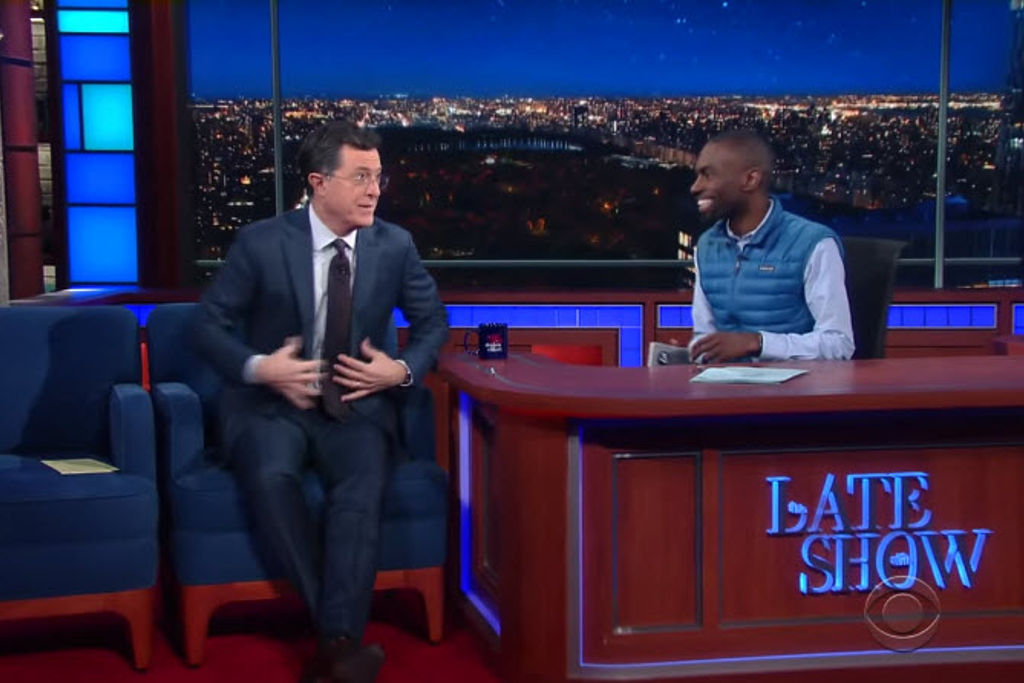Stephen Colbert Handed His Desk Over To A Black Lives Matter Campaigner For Martin Luther King Day
Colbert's willingness to make his audience uncomfortable makes for fascinating TV.

Yesterday was Martin Luther King Day in the States, the holiday where America remembers the life and philosophy of the iconic civil rights leader, minister and orator.
King’s achievements and legacy are immense and undeniable, but in recent years rampant inequality and seemingly endless police shootings have suggested much of King’s work remains undone, and that key parts of his message remain largely ignored. As movements like Black Lives Matter have grown in response, so too has recognition — and emulation — of the more radical, revolutionary aspects of King’s creed that in previous years were downplayed in favour of an image of King as an inoffensive, vaguely inspirational speechmaker.
In keeping with King’s core belief of direct, nonviolent protest as a means to affect change in society, Black Lives Matter campaigners and others used the holiday celebrated in his name to take to the streets. BLM activists blocked all westbound traffic on San Francisco’s Bay Bridge to “reclaim MLK’s radical legacy,” while across the country people marched and protested for higher wages, an end to police brutality, and the right to organise at work.
Happy #MLKDay – May you use quotes from MLK that White people don’t really wanna hear. pic.twitter.com/WoG5xmQWl0
— nukirk.digi.tal (@nukirk) January 18, 2016
This often-overlooked line from MLK’s ‘I Have A Dream’ speech still resonates today https://t.co/4Z5EtkG9UX #MLKDay pic.twitter.com/WIvfgbWc5v
— CNN (@CNN) January 18, 2016
Against this backdrop, Stephen Colbert’s Late Show decided to do something slightly different. Unlike other late-night shows, Colbert’s Late Show has taken on a distinctly political bent; guests like Aziz Ansari, Bill Maher, Senator Claire McCaskill and Killer Mike have turned a traditionally light and fluffy format into a space to discuss weightier topics that don’t often get a run.
And so it was on this year’s MLK Day, when Colbert’s guest of choice was civil rights activist and Black Lives Matter campaigner DeRay McKesson. McKesson has become one of the most widely-recognised faces of Black Lives Matter and similar movements; he’s the co-founder of Campaign Zero, a movement to eliminate racialised police violence, and his coverage of protests in Ferguson and Baltimore have earned him a national profile.
As a guest on Colbert’s show, McKesson wasn’t there as a wallflower: the pair discussed historical and contemporary racism, the definition and function of white privilege, the reluctance of much of white America to engage with the issues motivating Black Lives Matter, and the nature of police power and overreach.
While the chat was curtailed both by the format and by things not touched on — it would have been interesting if the two had discussed the lack of diversity on the Late Show‘s own writing staff, for instance — it was a thought-provoking and valuable eight minutes of television. It’s difficult to imagine a conversation like this happening on Australian TV without Pauline Hanson getting equal airtime for the ratings, or being cut off by a host unwilling or unable to engage with something that might make the audience uncomfortable. Colbert’s shown a willingness to do that, and it’s not nothing. As McKesson says: baby steps.